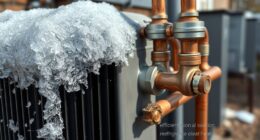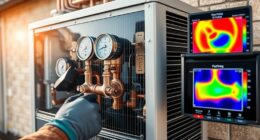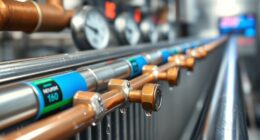We’ve all heard the claims. Heat pumps are inefficient, costly, and harmful to the environment. But what if we told you that these myths could be disproven with green innovation?
In this article, we’ll delve into the truth about heat pump efficiency and how green technology can maximize its potential. Get ready to challenge your preconceptions and explore the possibilities of renewable energy techniques for heat pumps.
It’s time to embrace the power of green innovation.
Key Takeaways
- Heat pumps work efficiently in cold climates by extracting heat from outdoor air.
- Heat pumps can operate in temperatures as low as -15 degrees Celsius.
- Heat pumps are highly efficient because they move heat instead of generating it.
- For every unit of electricity consumed, a heat pump can produce up to three units of heat.
The Importance of Green Innovation in Heat Pump Efficiency
As we delve into the importance of green innovation in heat pump efficiency, it’s crucial to understand the role it plays in reducing energy consumption and promoting sustainable practices.
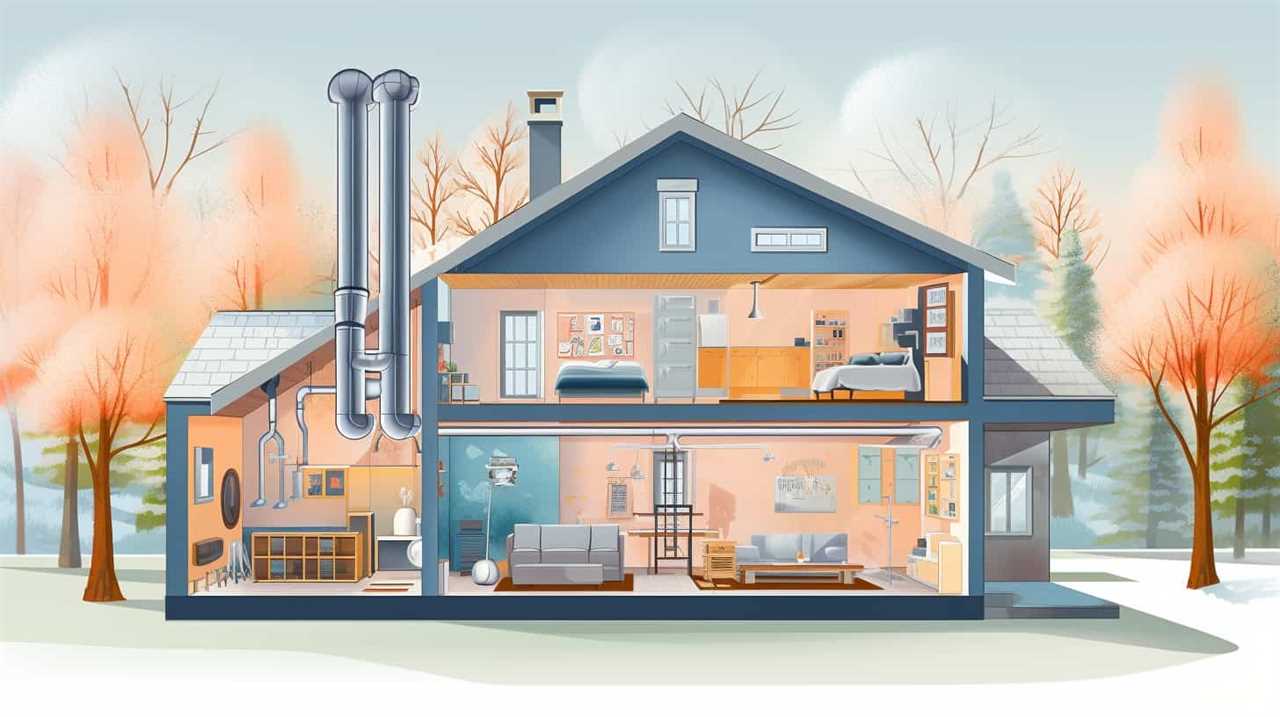
Green energy solutions and sustainable heat pumps are at the forefront of addressing the environmental challenges we face today. By incorporating green innovation into heat pump technology, we can achieve higher levels of efficiency and decrease our reliance on fossil fuels. This not only helps us reduce our carbon footprint, but also contributes to a more sustainable future.
Green energy solutions, such as renewable energy sources and energy-efficient technologies, are key components of achieving this goal.
Sustainable heat pumps, designed to maximize energy efficiency and minimize environmental impact, play a significant role in reducing energy consumption and promoting a greener way of life.
Debunking Common Myths About Heat Pump Efficiency
Two common myths about heat pump efficiency are that they aren’t effective in cold climates and that they consume too much electricity. However, these misconceptions can be easily debunked with accurate information.
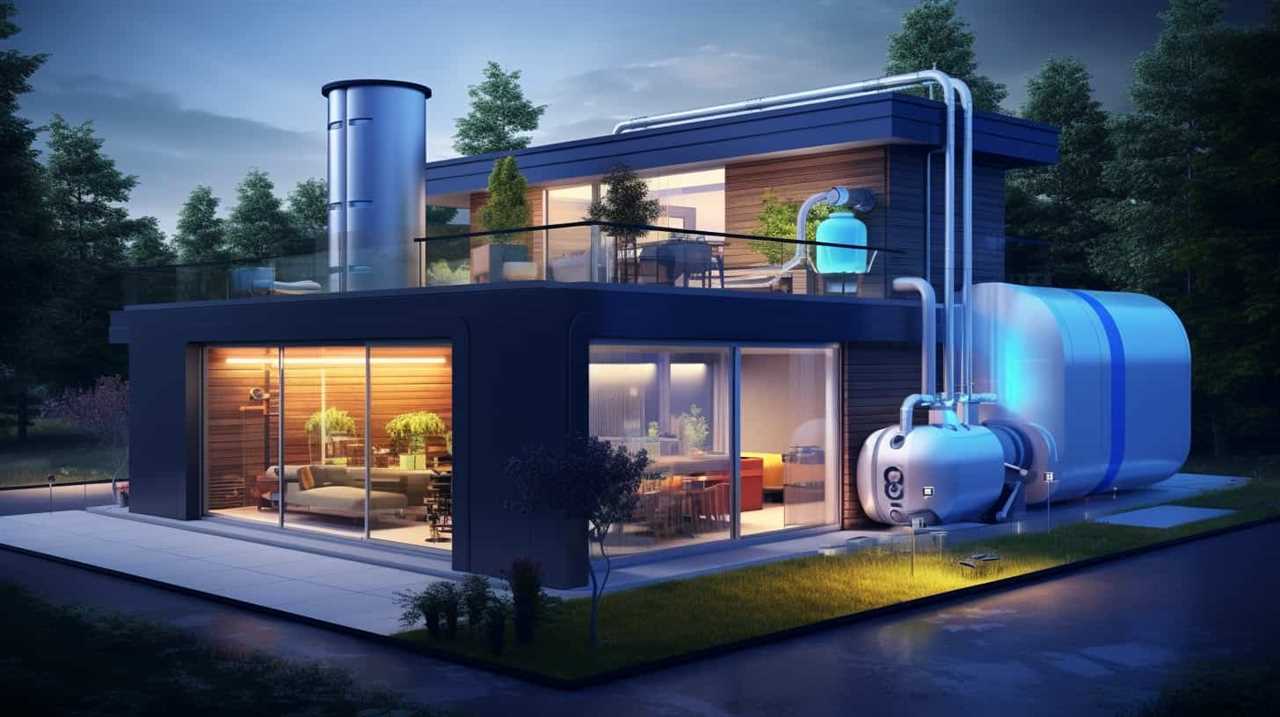
Heat pumps are actually designed to work efficiently in cold climates by extracting heat from the outdoor air and transferring it inside. They’re capable of operating in temperatures as low as -15 degrees Celsius.
As for electricity consumption, heat pumps are highly efficient because they don’t generate heat, but rather move it from one place to another. This means that for every unit of electricity consumed, a heat pump can produce up to three units of heat.
Exploring Innovative Renewable Energy Techniques for Heat Pumps
By incorporating innovative renewable energy techniques, we can enhance the efficiency of heat pumps and contribute to a greener and more sustainable future. Renewable energy sources offer sustainable heating options that can significantly reduce our carbon footprint. Let’s explore some of these techniques in the table below:
| Renewable Energy Technique | Description |
|---|---|
| Geothermal Heat Pumps | Utilize the constant temperature of the earth to provide heating and cooling |
| Solar Thermal Systems | Capture sunlight and convert it into heat energy for heating purposes |
| Biomass Boilers | Burn organic materials like wood pellets or agricultural waste to generate heat |
| Air Source Heat Pumps | Extract heat from the outside air and transfer it indoors for heating |
| District Heating Systems | Use a central plant to provide heating to multiple buildings in a community |
These innovative techniques not only reduce greenhouse gas emissions but also offer cost-effective and sustainable alternatives to traditional heating methods. By embracing renewable energy sources, we can create a more environmentally friendly and efficient heating system for a better future.

Maximizing Heat Pump Efficiency With Green Technology
We can improve heat pump efficiency by implementing green technology and through the use of renewable energy sources.
Green technology advancements have made significant progress in recent years, offering sustainable energy solutions that can maximize the performance of heat pumps. For instance, the integration of smart thermostats and advanced control systems allows for more precise temperature regulation, reducing energy waste and optimizing the heat pump’s efficiency.
Additionally, the use of renewable energy sources, such as solar or geothermal power, can provide a clean and abundant energy supply to operate heat pumps.
By harnessing the power of green technology and sustainable energy solutions, we can enhance the overall efficiency and effectiveness of heat pumps, making them even more environmentally friendly and cost-effective.

As we delve deeper into this topic, let’s now unveil the truth about heat pump efficiency and green innovation.
Unveiling the Truth About Heat Pump Efficiency and Green Innovation
With a focus on heat pump efficiency and green innovation, we’ll reveal the truth behind the effectiveness of these technologies in promoting sustainability and reducing energy consumption. Heat pump technology offers numerous benefits for sustainable heating solutions. Here are some key points to consider:
-
Energy Efficiency: Heat pumps are highly efficient, converting a small amount of electricity into a large amount of heat energy.
-
Renewable Energy Integration: Heat pumps can be powered by renewable energy sources such as solar or wind, making them even more sustainable.
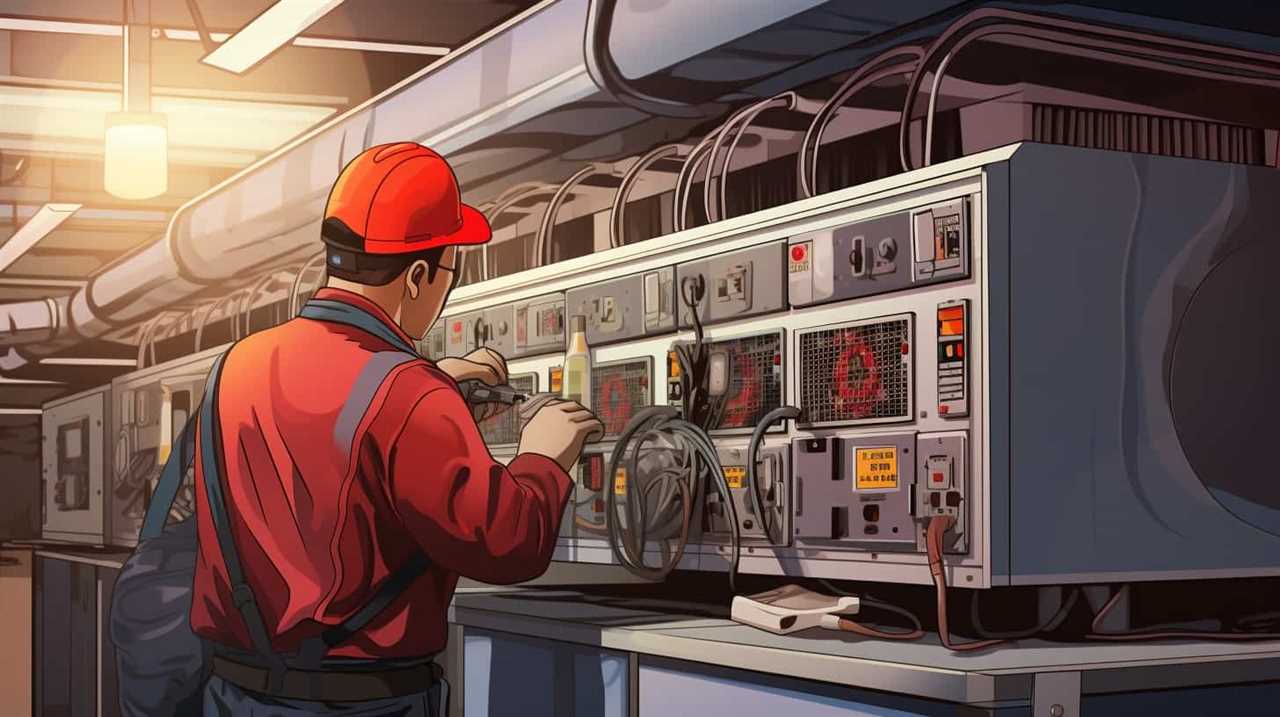
-
Versatility: Heat pumps can provide both heating and cooling, making them a versatile option for year-round comfort.
-
Lower Carbon Footprint: By utilizing heat pump technology, we can significantly reduce greenhouse gas emissions and combat climate change.
-
Cost Savings: Heat pumps can lead to lower energy bills due to their high efficiency, helping homeowners save money in the long run.
Frequently Asked Questions
How Does Green Innovation Impact the Efficiency of Heat Pumps?
Green innovation significantly improves the efficiency of heat pumps. The benefits of incorporating green technologies into heat pump systems include increased energy savings, reduced carbon emissions, and improved overall performance.

What Are Some Common Myths About Heat Pump Efficiency?
Heat pump myths, debunking efficiency. Many misunderstandings surround heat pump efficiency, but we’re here to set the record straight. Let’s explore common misconceptions and shed light on the truth behind heat pump performance.
How Can Renewable Energy Techniques Be Integrated With Heat Pumps?
Renewable energy integration with heat pumps allows for energy efficient solutions. By harnessing the power of renewable sources, such as solar or geothermal, we can maximize the efficiency of heat pumps and reduce our reliance on traditional energy sources.
What Are Some Green Technologies That Can Maximize Heat Pump Efficiency?
Energy storage and smart controls are two green technologies that can maximize heat pump efficiency. By integrating these technologies, we can optimize energy usage and ensure that heat pumps operate at their highest efficiency levels.
What Is the Truth About the Relationship Between Heat Pump Efficiency and Green Innovation?
The truth about the relationship between heat pump efficiency and green innovation is that it plays a crucial role in optimizing heat pump performance and minimizing the impact on environmental sustainability.
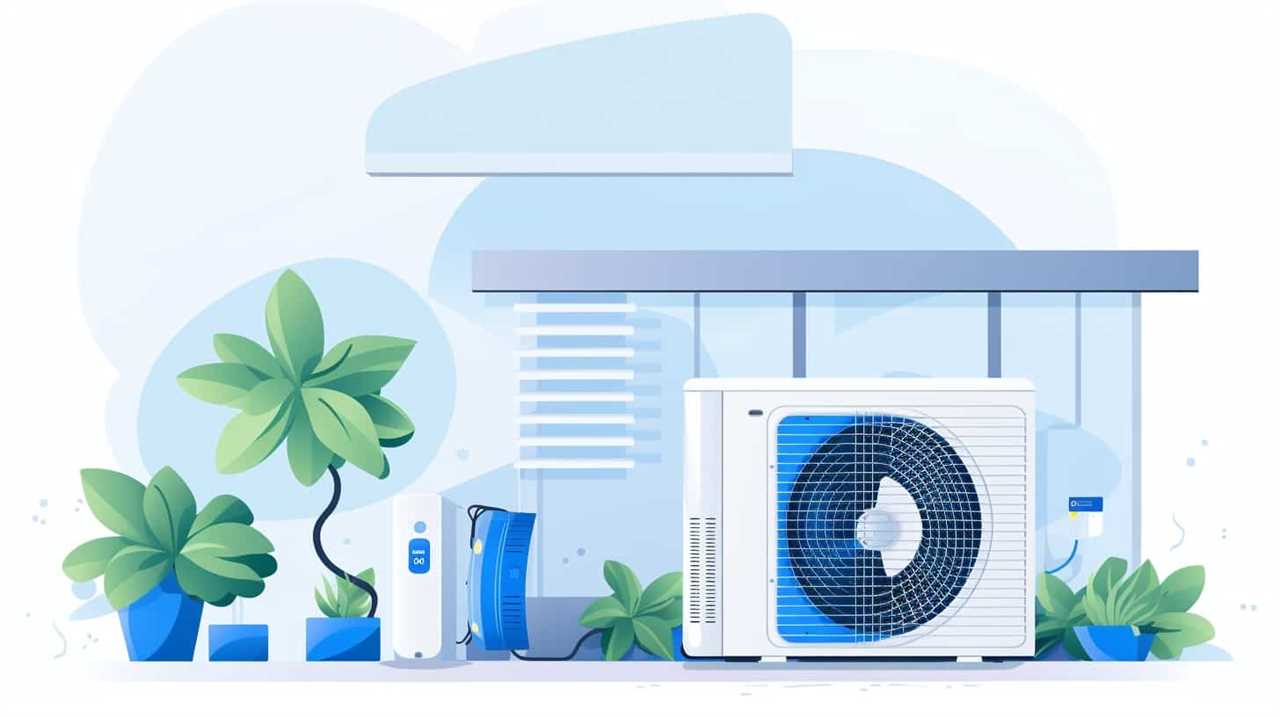
Conclusion
In conclusion, debunking myths about heat pump efficiency and embracing green innovation is crucial in maximizing the potential of this technology.
By exploring innovative renewable energy techniques and utilizing green technology, we can achieve higher levels of efficiency in heat pumps.
It’s time to unveil the truth and embrace the power of green innovation to create a more sustainable and efficient future.
After all, as the saying goes, ‘When it comes to heat pump efficiency, green innovation is the key that unlocks the door to a brighter tomorrow.’







